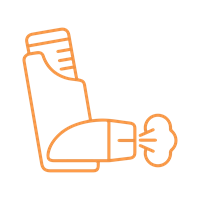Published
on
April 28, 2021
| 3,867 views
| 1 follower
members are following updates on this item.

 Asthma is a lung disease that causes your airways to narrow and produce extra mucus. The airway constriction and mucus can make breathing difficult and trigger coughing, wheezing and shortness of breath. For some people, asthma is a minor nuisance but for others it can be life-threatening. Asthma cannot be cured, but avoiding the triggers that cause an attack can help control the symptoms.
Asthma is a lung disease that causes your airways to narrow and produce extra mucus. The airway constriction and mucus can make breathing difficult and trigger coughing, wheezing and shortness of breath. For some people, asthma is a minor nuisance but for others it can be life-threatening. Asthma cannot be cured, but avoiding the triggers that cause an attack can help control the symptoms.According to the Centers for Disease Control (CDC), about 25 million – or 1 in 13 people – have been diagnosed with asthma in the United States. Although anyone can have asthma, it most commonly occurs in children and adolescents aged 5-17; females; people living in urban communities, people with a family history of asthma and people with a medical history of allergies.
 Breathing difficulties is one the primary symptoms of asthma, but a host of other symptoms are common:
Breathing difficulties is one the primary symptoms of asthma, but a host of other symptoms are common:
 Care for asthma involves getting the right diagnosis, developing the appropriate treatment plan and committing to regular follow-up with your provider to maintain control of your symptoms.
Care for asthma involves getting the right diagnosis, developing the appropriate treatment plan and committing to regular follow-up with your provider to maintain control of your symptoms.
To diagnose asthma, your doctor will review your medical history, conduct a physical exam and perform a simple lung function test to measure your breathing. Lung function tests are often done before and after inhaling a medicine known as a bronchodilator, which opens your airways. If your lung function improves a lot with use of a bronchodilator, you probably have asthma. Depending on your symptoms, your provider might also order a chest or sinus X-ray.
Even though there is no cure for asthma, it can be controlled. Each case of asthma is different, so it is important for you and your doctor to create a personalized asthma treatment plan. The personalized plan will have information about your asthma triggers and instructions for taking your medicines. Most asthma medicines are administered by breathing them in using an inhaler or nebulizer because it allows the medicine to go directly to your lungs.

There are several things you can do to control your asthma:
Avoid Your Asthma Triggers. Pay attention to when and where you have symptoms like wheezing and coughing. If you can pinpoint the things that cause your asthma flare-ups, you might be able to avoid them. Common triggers may include cold air, exercise, allergens like pollen and pet dander, and colds or bronchitis. Strong odors also can cause asthma attacks, so it may help to avoid things like hair spray, perfume, talcum powder, and cigarette smoke.

Dr. Bonitatibus, Anthony, MD is a board-certified allergist and a member of the Tanana Valley Clinic Allergy & Asthma department. Dr. Bonitatibus has comprehensive experience treating both adults and children with asthma. He is dedicated to keeping his patients healthy and breathing comfortably.
Page Options